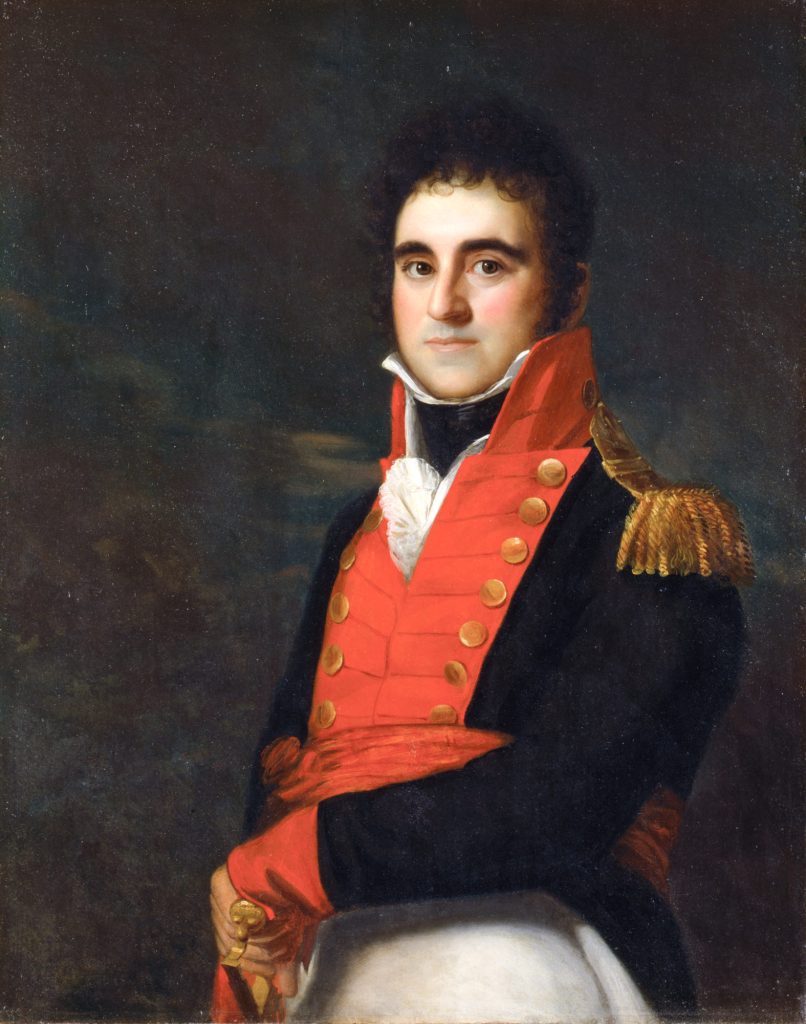“Sum must spill there blood,” wrote Mordecai Myers to Naphtali Phillips during the War of 1812, “and others there ink.” This jocular swipe at his friend, editor of what Myers termed the “kasher” National Advocate, points to the ardor with which this man of action would set to things throughout his life.
Mordecai was born in Newport, the son of a Hungarian emigrant, Benjamin Myers. His father died while he was still quite young, and his mother, a Loyalist, moved with her son to Nova Scotia after the Revolution. For unknown reasons they returned to the United States, settling in New York and amongst the community around congregation Shearith Israel.
Already a battalion commander in the state militia, Myers received a commission as captain of the 13th infantry just before the outbreak of the War of 1812. Later in life, Myers would describe those who flocked to fight in the war as having fit one of three types: men who came “from motives of pride and love of military show and splendor… [those only interested in] employment and pay… [and those] from higher minded notions of national honor and patriotism.
Stationed near Buffalo, Myers sustained injuries at the Battle of Chrysler’s Field on November 11, 1813. Convalescing at the home of a Dr. Mann, Myers developed feelings for the physician’s niece, Charlotte Bailey. The Bailey family had been among the founders of Plattsburgh, New York, where the two were married only four months later.
The following year he was discharged, and the couple moved to New York. Myers’ life, however, would bear little resemblance to his life in New York before the war. For one, after his marriage he limited his association with the Jewish community in which he had been brought up. Myers also opted not to return to the world of business and trade at which he had tried his hand a few years prior. “It is a fine thing to abandon the persute of wealth,” he wrote, “I never ware hapy in persute of riches and now that I have abandoned it, I am much more contented.” His future instead lay in politics. He would eventually serve two terms as mayor of Schenectady and six terms in the New York State Assembly. In his mid-eighties he ran an unsuccessful campaign for Congress. Myers counted among his friends, Aaron Burr and Alexander Hamilton, DeWitt Clinton and President Van Buren.
This portrait of Myers was described Robert Lowell in his prose poem “91 Revere Street,” which appeared in his 1959 collection Life Studies, winner of the National Book Award for poetry and widely considered one of the principle poetic collections in twentieth century America. Lowell, a descendant of Myers, recalls the portrait hanging in the house of his cousin’s house:
The artist painted Major Myers in his sanguine War of 1812 uniform with epaulets, white breeches, and a scarlet frogged waistcoat. His right hand played with the sword “now to be seen in the Smithsonian cabinet of heirlooms.” The pose was routine and gallant. The full lipped smile was good-humoredly pompous and embarrassed….Undoubtedly Major Mordecai had lived in a more ritualistic, gaudy, and animal world than twentieth-century Boston. There was something undecided, Mediterranean, versatile, almost double-faced about his bearing which suggested that, even to his contemporaries, he must have seemed gratuitously both ci-devant and parvenu. He was a dark man, a German Jew…Our Major’s suffering almond eye rested on his luxurious dawn-colored fingers ruffling an off white glove.
